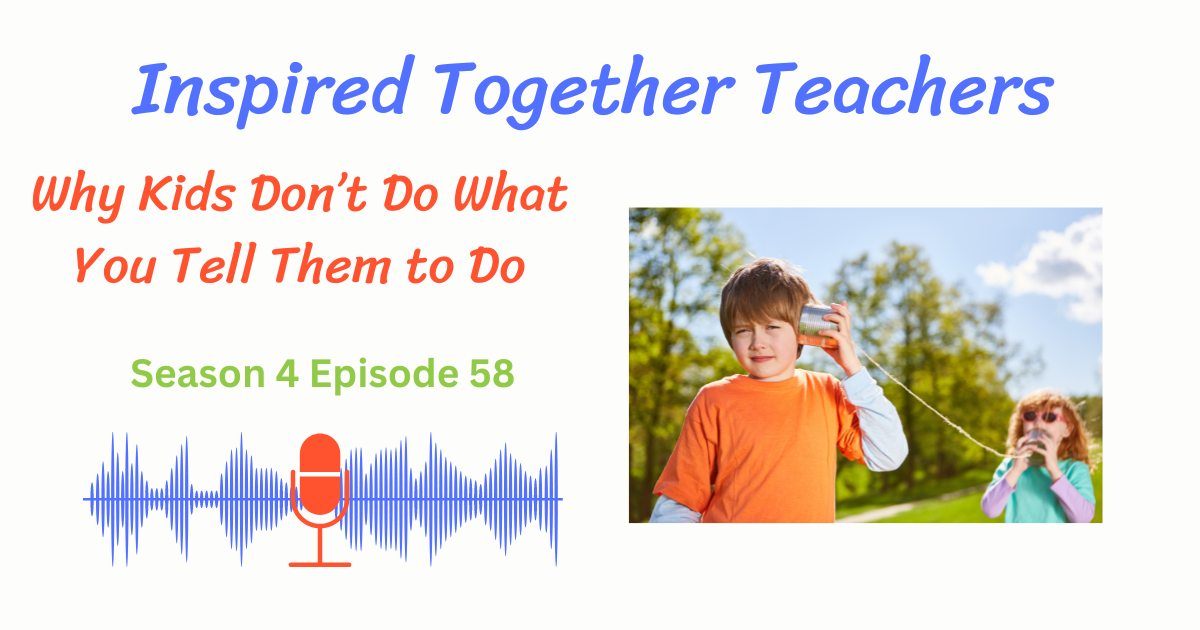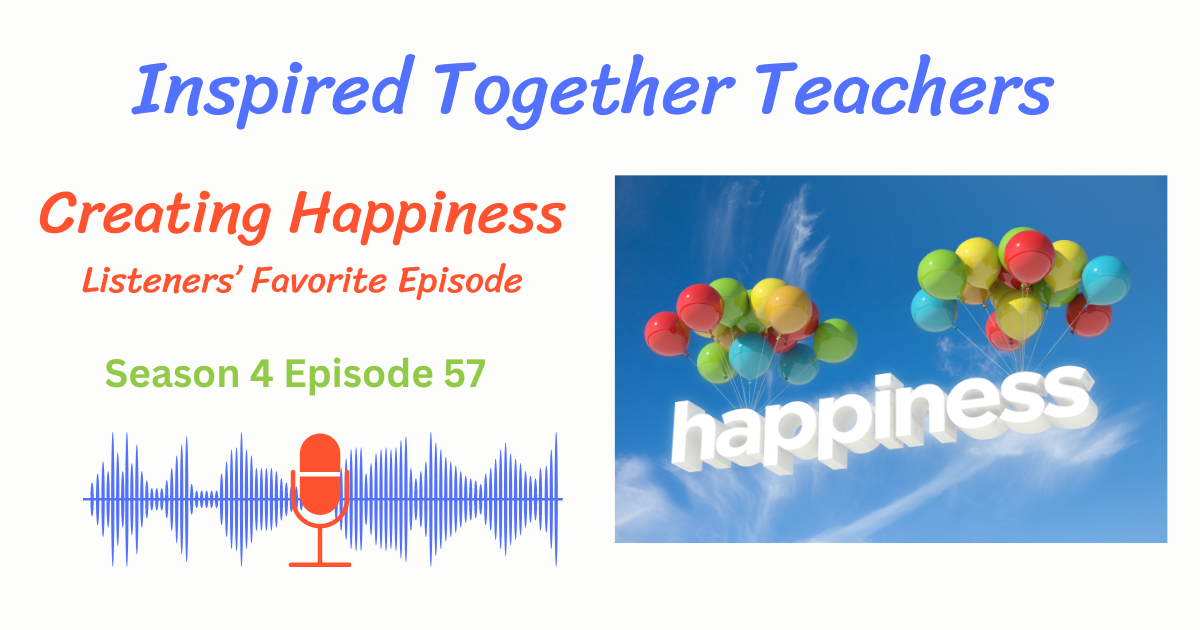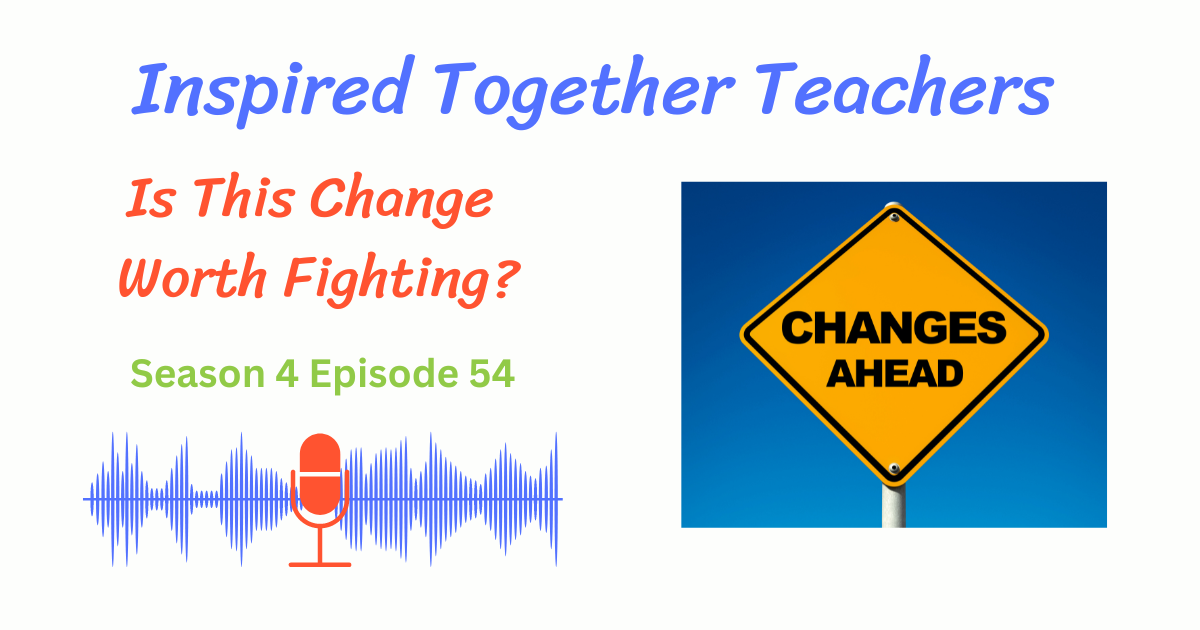Teachers Supporting Teachers S. 5 E. 62
Teacher support is more important now than ever before. Listen to this episode to learn some simple ways you can support other teachers.
Show Notes:
Episode Summary:
Let’s face it, teaching is not easy. Teachers are stressed. Teacher support is crucial, and who better understands our joys and frustrations than other teachers? Teacher relationships are a special kind of relationship. We are best when we are supporting each other. Teachers need each other and we need to support our colleagues and teacher friends, especially during stressful times.
In this episode, we share our favorite and most effective ways to support the amazing teachers in your teaching team, your building, or even in your family. We are best when we lift each other up so let’s dive right in and explore the best ways to help each other shine.
Note: As always, the following show notes are just an outline of the podcast episode. We share many examples and stories as we go through the discussion. For the best experience, we encourage you to listen to the episode.
In this episode:
We usually end our episodes with a quote or disperse quotes throughout the episode but today it’s important to start this episode with a quote.
Author and renowned educator, Robert John Meehan noted the importance of teacher support when he said, “The most valuable resource that teachers have is each other. Without collaboration our growth is limited to our own perspectives.”
No matter how many days, months, years or decades we have been teaching, we have all experienced the highs and lows of teaching. When this happens to you, who are your supporters? Who holds you up, encourages you, laughs with you, problem solves, listens and maybe even cries with you? We are guessing that you just imagined at least one teacher friend who has really understood and supported you.
Teaching brings many challenges and struggles.
We are all well aware of the struggles that teachers face on a daily basis: As we read this list, think about teachers in your life who may be experience these struggles:
- Overwhelm
- Exhaustion
- Curriculum challenges
- Content knowledge
- Behavior management
- Lack of confidence
- Doubt
- Many demands on their time and talents
- Unrealistic expectations
- Exhaustion/Burnout
- Struggles with work/life balance
- Collaboration with many people
- Professional development expectations/pursuits
Teacher support is clearly needed, and teachers can support each other with practical and effective strategies.
The people in your educational world can create a support system that works both for you and with you as you support each other.
Today we offer some ways to support your teacher friends and colleagues as they face adversity. By modeling these strategies, you are not only helping them but you may just be setting a precedent for how they help you in return when you are struggling.
You will notice that we are skipping some of the obvious things, like a Starbucks gift card or a scented candle, flowers for their desk, or bright new post it’s just to make their day. Those are all wonderful short term encouragement boosters.
However, what we’re talking about today are sustainable ways that you can communicate with your colleagues and teacher friends to let them know that you are there to support them through whatever struggles teaching throws their way. These are not “one-offs.” They are ways of being and interacting with your teacher people in meaningful and supportive relationships.
Encouragement
- Encourage them to ask questions.
- Remind them that all teachers struggle at times.
- Praise their good efforts.
- Remind them of their love for their work and how you see the positive impact of that work.
Sharing
- Share curriculum materials, strategies, and ideas.
- Share energy and enthusiasm.
- Share or offer a fresh perspective.
- Participate in Intentional shared learning opportunities such as lesson studies, book studies, or Professional Learning Communities (PLC’s)
Listening and Learning Together
- Listen- sometimes to solve a problem and sometimes so they can just vent.
- Listen without judgement.
- Help them set priorities.
- Model new technologies, techniques and strategies.
- Observe each other and share notes.
Set up or Capitalize on Existing Communication Structures:
Either utilize or suggest your school consider these school wide structures that support communication and support between teachers:
- Joint team planning or departmental planning time
- Co-teaching models
- Strong, ongoing mentoring programs
- Interdisciplinary teaching
There are so many forms of teacher support, and many of you are engaging these types of practices on a daily basis.
When we look at this list, we are reminded of so many things we hope to do through this podcast. We built our work around the need for teacher support and our desire to support teachers in the best ways that we can.
Though we aren’t there with many of you face to face, we do hope that you feel inspired by our encouragement, our sharing, our listening and learning together, and capitalizing on our available communication the best way we can through this modality of podcasting.
You do not have to be an experienced teacher to support other teachers. There is a lot of support we can gain from teachers who have been teaching longer and less time than us.
Conclusion:
We started this podcast with a quote from educator Robert John Meehan. It only seems fitting that we end with one of his quotes as well. He said, “A key to growing as a teacher is to keep company mainly with teachers who uplift you, whose presence inspire you and whose dedication drives you.”
It is our sincere desire that you walk away from this podcast with ideas of how to best support the teachers in your life. We are all better when we support one another.
Recap:
There are seasons in our teaching when we need support from other teachers and there are times when we get to support other teachers. As teachers, we are each other’s best supporters. In this episode we explored ways to support our teacher people through encouragement, sharing, listening and learning together, and capitalizing on or setting up existing communication structures. Who better understands our joys and frustrations than other teachers? Teacher relationships are a special kind of relationship. We are at our best when we are supporting each other.
Quote:
“The most valuable resource that teachers have is each other. Without collaboration our growth is limited to our own perspectives.”
“A key to growing as a teacher is to keep company mainly with teachers who uplift you, whose presence inspire you and whose dedication drives you.”
Robert John Meehan
Connect with the Inspired Together Teachers Community:
Website: https:www.inspiredtogetherteachers.com
Instagram: Inspired-Together-Teachers
Facebook: Inspired Together Teachers
Facebook Teacher Warriors Group: Teacher Warriors Facebook Group
Linked In: Inspired Together Teachers
More About Inspired Together Teachers:
Are you a teacher struggling to balance your best work with your best life?
If you are dedicated and caring but often overwhelmed and exhausted, join us at Inspired Together Teachers. We’ll give you inspiration, strategies and tips that help you navigate life’s challenges as a stronger, more confident, and more joy filled person, both in and out of the classroom.
Inspired Together Teachers will give you practical tools to experience more of what matters most in your life.
Co-hosts Paula Schmidt and Michele Vosberg are award winning educators with the experience and skills to help teachers thrive in life and work. They’ve taught at all levels, worked with thousands of teachers, and conducted workshops around the world. They are also the authors of the #1 best-selling book The Inspired Teachers Journal: A Weekly Guide to Becoming Your Best Self.
Paula and Michele would love to have you to join them on their quest to lived inspired lives.






